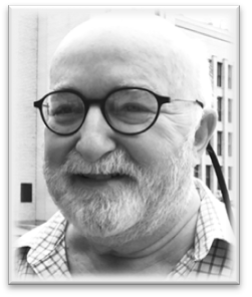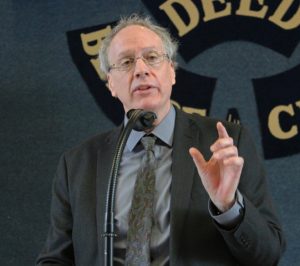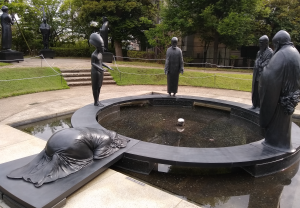 James K. A. Smith is Professor of Philosophy at Calvin University. We invited him to answer the question “Is there a future for the philosophy of religion?” as part of our “Philosophers of Religion on Philosophy of Religion” series.
James K. A. Smith is Professor of Philosophy at Calvin University. We invited him to answer the question “Is there a future for the philosophy of religion?” as part of our “Philosophers of Religion on Philosophy of Religion” series.
We now take for granted something that was virtually unthinkable just seventy-five years ago: that serious philosophical engagement with religion, even work that could be described as philosophical theology, is undertaken within the mainstream of the philosophical academy in North America. While religion was a persistent theme of philosophical reflection from Plato up through Hegel and even Nietzsche in the nineteenth century, the brief hijacking of Anglo-American philosophy by logical positivism had the effect of withering this subdiscipline in philosophy. But in the mid-twentieth century, after the implosion of logical positivism (whose shaky foundations couldn’t sustain critique), there was a movement of analytic philosophers that, in the course of challenging the epistemological assumptions of positivism, also cleared space for serious philosophical attention to God and religious phenomena. In different ways and in different streams, Elizabeth Anscombe, Alvin Plantinga, William Alston, Marilyn McCord Adams, Nicholas Wolterstorff, and many others began to unapologetically turn their philosophical tools to religious questions, while also letting their religious commitments inform their work on broader, mainstream philosophical issues in epistemology, metaphysics, ethics, and aesthetics. The result was not only a renaissance in philosophy of religion but also a burgeoning movement of Christian philosophy. It is telling, and encouraging, that several of these figures would be appointed (and honored) as presidents of the American Philosophical Association and would, in 1978, found the Society of Christian Philosophers. (This story has been well told elsewhere by Nicholas Wolterstorff.)
As most will concede, this is largely an “analytic” story; that is, this is a story about the demise and reemergence of religion in analytic philosophy, which is the dominant mode or style of philosophy in the Anglo-American academy, and also the stream that was most derailed by logical positivism. It explains why the so-called “renaissance” in philosophy of religion and Christian philosophy has been centered in analytic philosophy.
But the reason some philosophy is tagged as “analytic” is to distinguish it from another stream that we often call “continental” philosophy. I do not have any great stake in the distinction between “analytic” and “continental” philosophy except as a helpful description for different styles or streams of philosophical reflection. I appreciate Wolterstorff’s suggestion that “the identity of the analytic tradition is a narrative, rather than a purely systematic, identity. What makes a philosopher an analytic philosopher is that he places himself within a certain story line of philosophy in the twentieth century” (in Inquiring About God, p. 17). I would happily describe “continental” philosophy in the same way: there is no “essential” identity; only a historical, contingent, narrative identity insofar as the continental philosopher locates herself in a story of philosophical questions and debates that tracks onward from Edmund Husserl rather than, say, Gottlob Frege. And none of this precludes philosophers becoming conversant in both conversations.
With respect to religion, it is important to note that the continental stream was never hoodwinked by logical positivism and thus doesn’t have the same “Ichabod” episode in the twentieth century that it needed to overcome. To take just one example, questions about God, faith, and theology leave their mark across Heidegger’s corpus, from his early 1927 lecture on “Phenomenology and Theology” to his later critique of “onto-theo-logy” in Identity and Difference. And French philosophers working in Heidegger’s wake—what Alain Badiou calls “the ‘German move’” that is a feature of twentieth century French philosophy—continued to grapple with questions of God and religion, particularly in the work of Emmanuel Levinas, Paul Ricoeur, and Jean-Luc Marion, but also in more surprising thinkers such as Jacques Derrida. So when phenomenologist Dominque Janicaud pointed out (and criticized) what he described as a theological “turn” in phenomenology, the justifiable retort from philosophers like Jean-François Courtine, Paul Ricoeur, Jean-Louis Chrétien, Jean-Luc Marion, and Michel Henry was that theology had been woven into phenomenology almost since the beginning.
In that sense, questions about faith, religion, and God were never Verboten in continental philosophy the same way they were functionally outlawed by logical positivism’s hegemony in early twentieth-century analytic philosophy. However, insofar as the field of philosophy of religion (and Christian philosophy) congealed in response to analytic debates, the newly energized field of philosophy of religion tended to be synonymous with analytic philosophy of religion. Both the parameters of debate and methods for tackling the questions simply assumed the analytic story. But if Wolterstorff is correct (and I think he is) that what defines analytic philosophy is contingent—a particular history, even a particular bibliography, one might say—then philosophy of religion certainly shouldn’t be the exclusive province of analytic philosophy.
While the history of continental philosophy across the twentieth century testified to this, we can also admit that in the 1990s there emerged a more concerted effort to constitute continental philosophy of religion (and philosophical theology) as a field and subdiscipline within the North American academy. This included the launch of the Theology and Continental Philosophy Group within the American Academy of Religion and the founding of the Society for Continental Philosophy and Theology, leading, eventually, to the establishment of the Journal for Continental Philosophy of Religion.
In this sense, the very question, “Is there a future for philosophy of religion?,” perhaps reflects a sort of Cartesian anxiety whose pathology is uniquely analytic. In the phenomenological tradition, philosophy of religion has remained vital. Perhaps its distinct contribution to the future of philosophy of religion is to model, in particular, a philosophy of religion that is attuned to the practice of religion—attending to religion as a “form of life,” à la Wittgenstein, as a community of practice that carries a habitus, in Bourdieu’s sense of the term. For just this reason, phenomenology of religion also models a more constructive openness to the specificity of theology and liturgy, and is interested in religion as something that we do, not simply something that we believe.
Excerpted from the Introduction to James K.A. Smith, The Nicene Option: An Incarnational Phenomenology to be published by Baylor University Press (which will be released on August 16, 2021). Reprinted with permission.
 Hunter Brown is Professor Emeritus of Philosophy and Religious Studies at King’s University College, Western University, London Canada. We invited him to answer the question “Is there a future for the philosophy of religion?” as part of our “Philosophers of Religion on Philosophy of Religion” series.
Hunter Brown is Professor Emeritus of Philosophy and Religious Studies at King’s University College, Western University, London Canada. We invited him to answer the question “Is there a future for the philosophy of religion?” as part of our “Philosophers of Religion on Philosophy of Religion” series.



